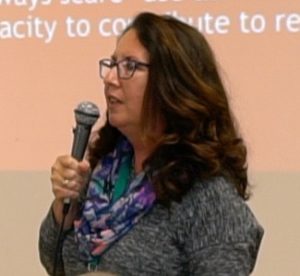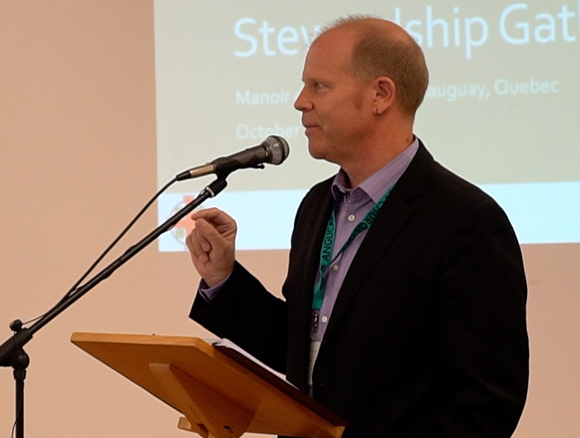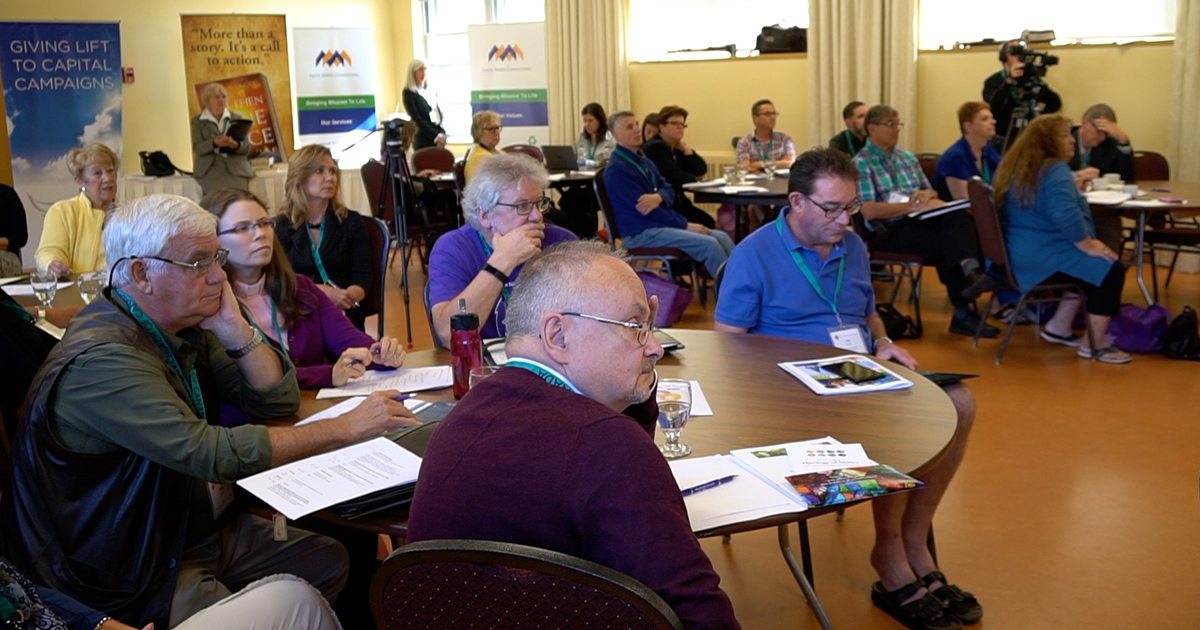Mention the word “stewardship” and the first thoughts that come to mind for many Christians may be raising money, or effectively managing the resources of a church or parish.
For Wendy Fletcher, president and vice-chancellor of Renison University College at the University of Waterloo, stewardship is a core element of Christian identity and its relationship to the world—a theme she explored this fall as a plenary speaker at one of two major stewardship gatherings organized by the Anglican Church of Canada with local partners.

In regards to stewardship, Fletcher said, “The first question cannot be, in this generation, how do we help our institution survive? Our first question has to be what does it mean to be faithful stewards of the gospel—which means, what does it mean to live Jesus as Lord rather than say Jesus is Lord?”
The need to link stewardship to gospel values was a common thread through much of the stewardship gatherings, which featured multiple workshops along with plenary speakers. Diocesan stewardship representatives and parish priests were among those attending the gatherings.
The first event, Generosity Conversations, took place from Sept. 27-29 in Saskatoon, Sask. and was presented by the Stewardship Education Network for Development. The second, With Our Thanks and Praise Stewardship Gathering, took place from Oct. 2-4 in Chateauguay, Que.
The importance of stewardship today
While the church has always had a need to pay its bills and fund its mission—as workshop facilitator and Executive Archdeacon Alan Perry noted, “The disciples had a treasurer”—changing times have brought a new level of importance to stewardship.
“It’s a lonely time to be the church,” Fletcher said. “It’s a lonely time to be a Christian … I spent 14 years in B.C. where the decline of Christianity is more advanced than it is here in Ontario, and in other parts of the country, and it’s a lonely business … You have this faith and you want to be responsible to it and for this institution that we’ve inherited and that we love, and yet trying to find partners for that work is an incredibly difficult business.”
Stewardship, she added, is “partnership based on a shared commitment to the well-being of the world, and the care of the gospel as a care for the world in new ways.”
Fellow plenary speaker Dean Andrew Asbil, who spoke at both the Saskatoon and Chateauguay events, said that stewardship is “part of our DNA”, a form of ministry that Christians have been called to from the very beginning of the church.
“Living as a community means that we’re sharing not just the work of ministry, but we’re also sharing in the expense and being generous,” Asbil said.

While suggesting that Christians may have been more comfortable talking about stewardship in the past, Asbil argued that the new century had provided “clarity” about the need to re-emphasize stewardship.
“I’ve been ordained for 30 years now, and one of the things that I was never trained to do in seminary and had to learn by trial and error was really talking about money,” he said.
“Hospitals do it well and universities do it well and the United Way does it well and all these other charities do it extremely well, and churches tend to shy away from it … We tend to become very passive, as opposed to also being able to say to our parishioners, ‘Have we got an opportunity for you to be generous for a ministry,’ and we need to be able to talk about it.”
In his presentation, Asbil highlighted a biblical passage from 2 Corinthians: “The one who sows sparingly reaps sparingly, and God loves a cheerful giver.” Discussing what it means to be a “cheerful giver”, he pointed to qualities such as giving from abundance, understanding that everything you receive is from God, offering as well as receiving, and inviting congregations to be “storytellers of generosity”.
“If people and members of the community are invited inside that conversation and participate in building the ministry and mission, they are more apt to be more generous,” he said.
Workshop presentations
To encourage further conversation and help participants build relationships, each gathering featured a variety of workshops that explored particular aspects of stewardship.
Some workshops emphasized the spiritual dimensions of stewardship. Facilitating his workshop “Discipleship Development Before Spiritual Education,” Canon Terry Leer described the primacy of God’s mission and developing disciples as key to helping congregations escape the mire of protectionist thinking, rooted in a desire to return to “the nostalgia of bygone days”.
Generosity, Leer said, is most closely linked to the ‘why’ of the church’s existence—its very purpose.
“Once we have adequately formulated the ‘why’, then we can begin to design the ‘what’ of ministry, including stewardship education,” Leer said. “That will lead us to the ‘how’ of ministry, the concrete steps we will take to fulfill our purpose.”
Greg Masse, president of the White Wing Group, a firm that helps churches build capital campaigns, offered lessons from his company’s experience helping congregations raise money for goals such as roof and building repairs. He described the “essential ingredient” of stewardship campaigns as love—“love for your parish, love for your church, love for your building, love for your community, love for your parishioners, and you really feel that emotion.”
“It’s really about getting enthusiasm and sparking emotion and love and care in the campaign, and that comes from the top down,” Masse said.
Other workshops examined more practical aspects of stewardship. In a workshop on planned giving, facilitators Glen Mitchell and Peter Bennett explained the concept of gift planning—giving a gift of capital rather than income, which tends to encompass a more long-range, intentional, and unconditional outlook on the part of those who give.
“Talking with these people needs to be visionary, values-driven, narrative and accountable,” Mitchell said. “These last two are about creating a picture of the future and being trusted to carry it out.”
In “Lessons from a Capital Campaign”, Executive Archdeacon Alan Perry offered lessons form a recent campaign in the Diocese of Edmonton.
“I think the key things that we learned were that, although it’s a frightening thing to ask people for large amounts of money, if you do your homework and you’re well-prepared, you can do it and you can do it successfully,” Perry said.
“People are generous and will contribute to a cause which they find compelling.”
Interested in keeping up-to-date on news, opinion, events and resources from the Anglican Church of Canada? Sign up for our email alerts .

